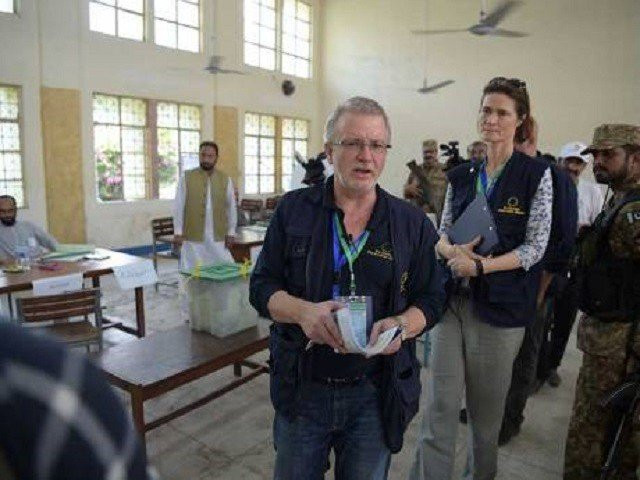Enter 'Naya Pakistan': Elections 2018 and the 'foreign press'
'A good journalist is always able to write between the lines'

European Union observers monitor elections in Pakistan
PHOTO: AFP
Writing on the popularity of Pakistan Tehreek-e-Insaaf (PTI) chief Imran Khan, the NYT noted: "He has used his celebrity, his charisma and his money to campaign against corruption, one of the most unifying issues in a poor nation that struggles with many dividing lines. "The article went on to address Khan's metamorphosis, saying he had gone from being a 'international hottie' to following "pious Islam".
Start of Imran’s Innings
The Economist, separately, termed the putative prime minister the nation's new president.
Imran Khan, Pakistan's new president, inherits a country that has been torn apart by war and terrorism for the past 70 years. But one Pakistani woman has fought religious extremism—and won pic.twitter.com/vkunZmAxxp
— The Economist (@TheEconomist) July 27, 2018
Quoting Pakistani-British journalist Gul Bukhari's claims of "pre-poll rigging", "intimidation" "muzzling of media" and "judicial manipulation" marring the polls, the BBC termed the exercise 'Pakistan's dirtiest election in years.'
British Sunday newspaper The Observer alleged that the security establishment "engineered" the polls by coercing Pakistan Muslim League-Nawaz (PML-N) leaders into switching allegiance, cracking down on party activists, deploying three times more troop across polling stations and pressurising journalists and activists to promote PTI.
What The Observer piece lacked was context. Poor nationwide order, which manifested itself in the dastardly Quetta suicide bombing, did not merit mention. Nor did the article feature any PML-N member (current or erstwhile) going on the record.
The Indian Express provided little more than a formulaic break down of Parliament's inner workings and outlined the historical trajectory of elections in Pakistan. Another piece carried by the same publication elucidated on how 'army-favourite' Khan was poised to lead the nation.
As all the aforementioned pieces lacked critical versions, The Express Tribune reached select journalists to weigh on international coverage of the elections.
Mazhar Abbas
Mazhar Abbas presented his two cents on 'press censorship' reported by the BBC. "There is always pressure. A good journalist, however, is always able to write between the lines. While some people happen to be blunt, others make measured statements." Many gifted journalists, he said, had been able to air what they felt while avoiding controversy.
Putting things into perspective he said, "There was no blackout against Pakistan Muslim League-Nawaz but we have experienced other forms of censorship such as the circulation of press advice before going live or certain speeches being muted. Censorship prior to elections has been complicit in every era, so this not something in ordinary," he said.
The BBC also reported how former prime minister Nawaz Sharif's arrest elicited public sympathy and "thousands attended his rallies, but the media did not carry any of the protests in Lahore or Rawalpindi" or his daughter "Maryam Nawaz's fiery speeches."
Badar Alam
Badar Alam termed the bias pre-poll rigging. “An imbalance was evident. We saw certain individuals events receiving more coverage than others. Case in point Nawaz's return. While his arrival and surrender received minute to minute updates, there was no documentation of the rally that followed in Lahore.”
Zarrar Khoro
Zarrar Khoro had much to posit on this account too."The BBC story assumes that anyone who uses Twitter is an activist." Khoro trashed the choice of words employed in the piece. "There's a certain way to criticise the election process and to make demands irrespective of the medium used. It is always predicated on what opinions one is talking about."
“Even if certain journalists want to declare the elections rigged and fraudulent they have to adhere to some journalistic ethics while doing that. Passing slurs at politicians or institutions alike, is quite aberrant. I for one, am not going to make any sweeping statement."
Partisan coverage of elections and the ensuing offence is in some ways an external magnification of the internal dichotomy proliferated by news organisations.
"Of course they have not contextualised these elections. Why would they? News organisations run stories according to their own audience," an industry veteran said on the condition of anonymity. All of our political issues are for us to analyse but it is our own that have created this abject polarisation that foreign media picks up on."
Indian media unleashes rant against Imran
One reason explaining why foreign publications run stories like those aforementioned was them being premised on 'leaks' by local journalists, he said. “Ironically, we treat foreign media as a monolith. Our window is very limited. We tend to collectively term a handful of American, British and Indian publications foreign media".
Indeed, one of the many "dividing lines" the "poor nation" struggles with is the polarisation of international media outlets. We, the nation have witnessed proverbial, dramatised and partisan coverage in the interlude between the Panama Papers controversy and elections. Thereon it was taken to its logical conclusion by the international press.



1724319076-0/Untitled-design-(5)1724319076-0-208x130.webp)















COMMENTS
Comments are moderated and generally will be posted if they are on-topic and not abusive.
For more information, please see our Comments FAQ